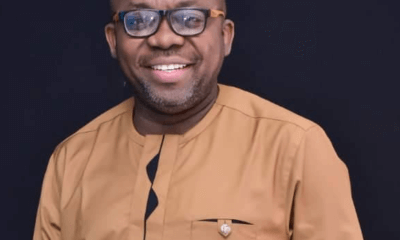National Issues
The Youth And The Future Of Nigeria -By Adeniji Abdur-rahman Adekunle
In this essay, I hope to provoke our thoughts, conscience, and souls; hopefully to add to the clarion call for youth involvement and for the placement of the needs and aspirations of our youths high on the priority agenda of national policies and programs. National progress and development is conditional on the youth playing more appropriate roles in the political sector. Nigeria neglects its youth at its own peril. The youth are our future! We must guard, protect and nurture our future.

“Never doubt that a small group of thoughtful and committed youths can change the world; indeed, it is the only thing that ever has.” –Margaret Mead.
It goes without saying that there is a strong linkage between the youth and national development. This linkage is so strong that each side depends on the other for its sustenance. The wheel of development of any nation lies on the shoulder of the youthful population. As the most active segment of any society, the youth are the major determiners of peace and stability of a nation. The youth are the engine of growth and economic development because they provide the labour force for the production of goods and services. As a people, their actions and inactions can make or mar any nation. The youth are the cornerstone to societal rejuvenation. I can go on to mention more significance of the youth to drive home the point that their roles in national development cannot be over emphasised. However, I believe it suffices to end the list here, for the purpose of clarity and focus, by affirming the universal creed that the youth are the leaders of tomorrow. This is why a society that prepares its youths for the sake of future aspiration will not only secure its future development, but will also prepare its next set of leaders to tackle the challenges of national reconciliation.
If the aforementioned points are so significant, then it should be noted that at a time like this when there are clamors for “restructuring”, “true federalism” and other propaganda coupled with the chronic challenges of bad governance, it is pertinently apt to pose such questions as: “what future for Nigeria?” and what is the role of key stakeholders, such as the youth, in shaping the future? A lot of agitations and counter-agitations are being made by people who classify themselves, or are being classified as “youth” in different realms of life. Are they, really, the youth? Who are the youth, and what should be their appropriate role for the future of our country? This essay hopes to contribute to a clearer understanding and conceptualization of who the youth are, what are their characteristics and the nature of the challenges they face in Nigeria, what roles the youth should be playing to assure the prospects of a better future for Nigeria, notwithstanding the challenges which trouble them.
To start with, it should be noted that there is no universal definition of the word youth. It is defined based on different criteria. “Youth” is traditionally defined as the period of transition from childhood to adulthood. The United Nations Organization (UN) defines the youth as young people who fall in the age category of 15 to 24 years. The United Nations Educational Scientific and Cultural Organization (UNESCO), a specialized agency of the UN, has expanded this definition to cover all those who fall within the age category of 15 to 34 years. For the Economic Community of West African States (ECOWAS), the youth are those within the ages of 15 and 35, as likewise recognized in the African Youth Charter. However, this is a broad definition and several African countries define their youth populations differently. Nigeria, as the case study, defines the youth as all young persons of the ages 18 to 35 years according to the National Youth Policy (2009). Standing on this definition, the youth population was estimated at 61,306,413 or 31.7% of the total population projection of 193,392,517 by the National Population Commission in 2016. This is one of the highest percentages of youths in any country. However, to what extent has this huge population of able-bodied citizens been put to use in our dear fatherland?
Indeed, it is paradoxical that globally the youth are a “demographic majority” and yet a “political minority”. Youth activism is an essential ingredient of politics. Historically, this has been so, with many concrete illustrations, which can be drawn from many countries. Yet, contemporarily, in most countries, especially so-called developing countries such as Nigeria, the role of the youth in politics has been relegated to merely being mobilized as weapons in the arsenal of reckless political godfathers. Educational policies fail to address their needs and aspirations, economic policies undermine their potentials and dampen their spirits and national development policies also ignore their input, engagement and roles. It is imperative that we take measures urgently to empower and enable our youths to play appropriate roles in our politics in particular, and in our decision-making processes in general.
In this essay, I hope to provoke our thoughts, conscience, and souls; hopefully to add to the clarion call for youth involvement and for the placement of the needs and aspirations of our youths high on the priority agenda of national policies and programs. National progress and development is conditional on the youth playing more appropriate roles in the political sector. Nigeria neglects its youth at its own peril. The youth are our future! We must guard, protect and nurture our future.
The place and importance of the youth in the development process was aptly described by the Nigerian National Youths Policy (2009) in this way: “The youths are one of the greatest assets that any nation can have. Not only are they legitimately regarded as the future leaders, they are potentially and actually the greatest investment for a country’s development. They serve as a good measure of the extent to which a country can reproduce as well as sustain itself. The extent of their vitality, responsible conduct, and roles in society is positively correlated with the development of their country”. Now, let us examine some of the roles of the youth in securing the future of Nigeria.
First and foremost, the role of youth in political development: The Nigerian youth are currently faced with the task of redefining their roles in governance. Given the right climate, the following are considered as the role-expectations of the Nigerian youth in the political and developmental processes. First, the youth should parade themselves as agents of political socialization—the ways in which political values are formed and utilized in the society. Active participation in governance at all levels including student organizations in higher institutions is another process through which the youth can make impact in the political and developmental processes. Grass-root politics will afford the youth the opportunity to identify with the masses, appreciate their problems and master the terrain. In a nascent democratic system like Nigeria, learning by participating in grass-root politics is the best way to curb the widely spread infection of glorified servants under the tutelage of greedy political godfathers.
Secondly, the role of youths in non-governmental organizations: Across every major settlement in Nigeria, various types of organizations exist. However, the thriving organizations now are the ones formed by youth. The essence of the formation of these organizations is to supplement government efforts in community development projects. These organizations are the closest to the people at the grassroots level, because they are formed by the members of the community themselves. Like any other community-based organizations, youths community-based organizations can enhance community and national development through the promotion and implementation of sustainable projects for the benefit of the citizens; enlightening and mobilizing members of the community for national development; strengthening community resources management; and many other ways.
Lastly, the role of youths in pace setting: The Nigerian National Youth Policy asserts that: “The youth are the foundation of a society. Their energy, inventiveness, character and orientation define the pace of development and security of a nation”. This statement acknowledges the role of the youth in upholding the pace of development in a nation. As the most active segment of any society, youths are the major determiners of progress and stability of the nation. Conversely, the degree of backwardness and instability in the society is also determined primarily by the youth. Considering their significance, the youth have the greatest responsibility to promote peace, security, stability and national unity. Democracy and good governance can only be nurtured and sustained in an environment of peace, security and stability. Where these are lacking, it is not only democracy and good governance that suffer, but also social progress and the future of the youth are seriously compromised.
As for the youth, there is the absolute need for a change of mindset, from despondency, apathy and “exiting the country”, to hopeful and positive, can-do attitude; in fact, to engagement and activism with purposefulness and integrity. These, I believe, are the attributes of the mindset required to move Nigeria out of its current state of chaotic befuddlement, to a greater future more assured. Nigerian young men and women must rise to get involved; to organize, not agonize! And take their destiny and our nation’s destiny in their hands. They should not allow others to hide behind their common identity as the youth to advance devilish agenda. They should lead to get the agenda crafted and their concerns squarely addressed.
So far, as Sweigart has aptly noted, “surging youth activism and leadership has the potential to change the world” and I add, to impact upon the future more positively. I, as a concerned youth, have striven to contribute my very humble quota towards the correct understanding of the position of the youth to the future of Nigeria in the previous paragraphs, and when called upon, I shall be ready to serve my fatherland to the best of my ability. The potential of the youth to change Nigeria for a better future must be tapped maximally. No effort should be spared to encourage youth engagement, catalyze it, nurture and institutionalize it.



















